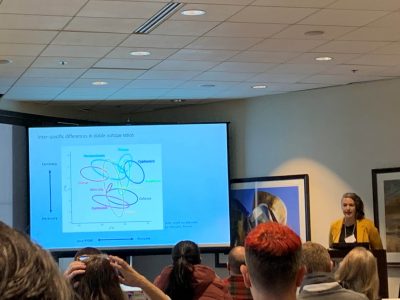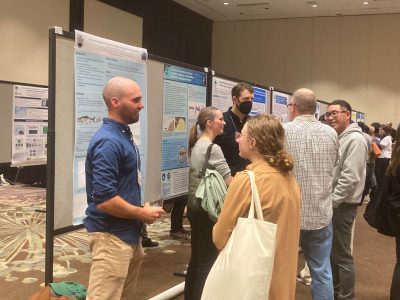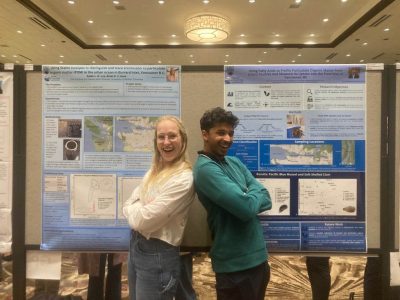We are well into the United Nations’ Decade of Ocean Science for Sustainable Development, and a symposium held by the North Pacific Marine Science Organization (PICES) brought scientists from all around the world to Seattle, Washington in late October took a look at how far we have come and how far we still have to go.
Several members from the Institute for the Oceans and Fisheries presented at the symposium with the IOF’s own Anna McLaskey, who won the best oral presentation in the Biological Oceanography Committee section.

Dr. Anna McLaskey presents at PICES
Zooplankton are critical to their ecosystems for many reasons, one being that they are vital prey to many marine animals, including being the sole food source for the gigantic baleen whale. These tiny organisms also eat much of the carbon dioxide fixed by phytoplankton, causing the carbon dioxide to sink to the seabed, taking it out of our atmosphere. McLaskey’s work complements an ongoing time series project maintained at the same location in British Columbia by the Hakai Institute, and was done in collaboration with Fisheries and Oceans Canada. It involved the work of many members of the Pelagic Ecosystems Lab.
Sustainable seas and healthy ecosystems truly does take a village, and the PICES Symposium focused on connecting scientists and communities together to foster ideas for a healthy future. The organization itself was established in 1992 with present member states being Canada, Japan, People’s Republic of China, Republic of Korea, the Russian Federation, and the United States of America.

Jacob Lerner discusses his poster with an attendee
“Attending PICES was a great experience and the first time I presented my postdoctoral work in person,” said McLaskey. “In addition to my talk and being able to discuss the role of diverse prey sources with other zooplankton ecologists, a highlight of the conference for me was the workshop our group led on developing a conceptual framework to investigate and address urban impacts in coastal seas.”
The symposium focused on climate change, fisheries and ecosystem-based management, along with the social, ecological and environmental dynamics of marine systems, coastal communities and traditional ecological knowledge. The priority was to engage with one another and learn from different pools of knowledge, all united by the common goal of saving our oceans.
IOF attendees also included Dr. Brian Hunt, Jacob Lerner, Dilan Sunthareswaran, Sadie Lye, and Dr. Loïc Jacquemot from the Pelagic Ecosystems Lab; Dr. Juan Jose Alava, Dr. Zeinab Zoveidadianpour, and Kiah Lee from the Ocean Pollution Research Unit, as well as Dana Price who is cross appointed in OPRU and the Marine Mammal Research Unit, and IOF Adjunct professor, Dr. Stephen Raverty; Aleah Wong from the Changing Ocean Research Unit; and, Dr. Szymon Surma from the Marine Zooplankton and Micronekton Laboratory.

IOF students Sadie Lye and Dilan Sunthareswaran
Jacquemot’s current project focuses on using eDNA to map fish distribution in British Columbia’s fjords, and the symposium presented several opportunities to integrate new knowledge into his coming research. The symposium also allowed researchers to expand their topics of interest, with different projects taking center field, including one on European green crab invasion and ecosystem-based management exploration with Indigenous communities, NGOs, and government agencies.
PICES 2024 will be held on October 26th, 2024 in Honolulu, USA. The topic will be “The FUTURE of PICES: Science for Sustainability in 2030.”
Photos provided by Dr. Brian Hunt.
Tags: Anna McLaskey, Brian Hunt, CORU, IOF postdoctoral fellows, IOF Research Associates, Juan Jose Alava, Loïc Jacquemot, Marine Zooplankton and Micronekton Laboratory, MMRU, OPRU, Pelagic Ecosystems Lab, PICES, Szymon Surma